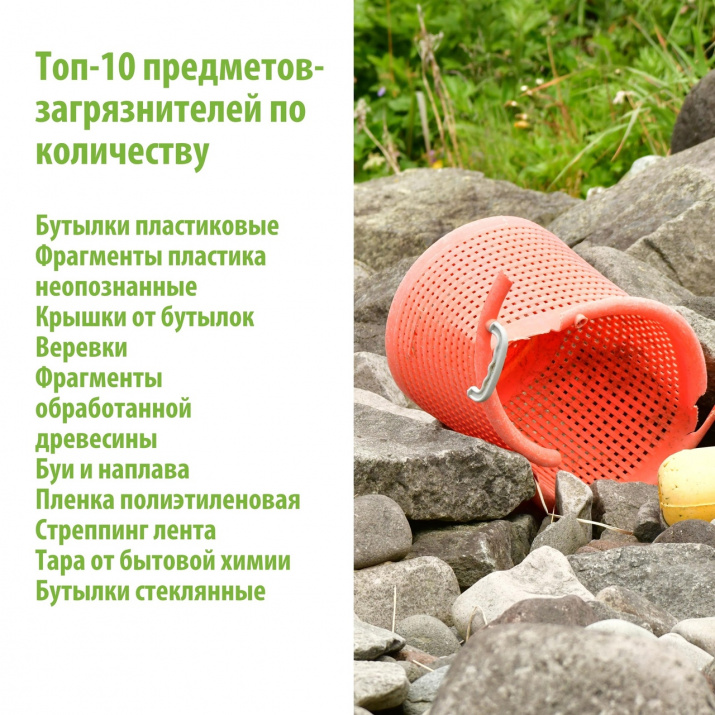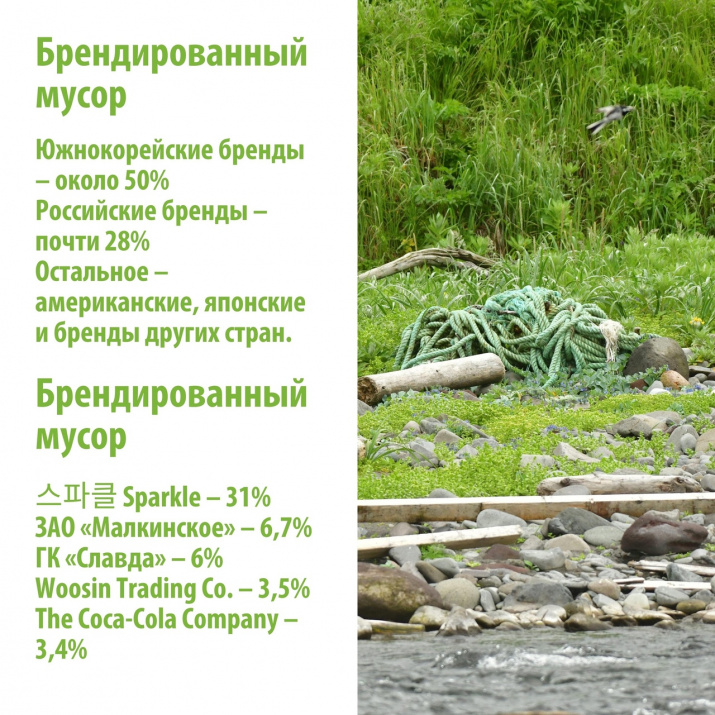The most common type of garbage on the coast of the Sea of Okhotsk in South Kamchatka Federal Reserve is plastic bottles and their caps. In terms of weight, ropes and fishing nets dominate the total mass of items littering bays and beaches. The undisputed leader in the production of pollutants is South Korea, which accounts for more than half of the detected waste. These are the results of a study carried out by the staff at Kronotsky Nature Reserve with the support of the Republic of Khakassia Branch of the Russian Geographical Society.
The collection and classification of garbage within the framework of a large-scale joint expedition of Kronotsky Nature Reserve, “RusHydro” PJSC, and “Zapovednik” charitable environmental foundation were carried out in July 2021. They were attended by cartographic engineers, a waste management expert, and volunteers, who inspected seven sections of the coast of the Sea of Okhotsk, each one kilometer long. The trash was identified and classified according to parameters such as material, number of fragments, weight, brand and others.
In total, almost 7.5 thousand fragments of marine debris were found. Its total weight was approximately three tons.
The main material polluting the coast of South Kamchatka Reserve is plastic. It accounts for approximately 87% of the total number of fragments and 69% of the total mass of marine debris. At the same time, for every kilogram of household plastic there are three to seven kilograms of plastic fishing and shipping gear.
Marine debris literally kills animals. In the reserves of the Far East, tragic cases of injury and death of animals and birds are regularly observed. According to the expert on marine mammals, Vladimir Vertyankin, net fragments with buoys are becoming one of the most common causes of whale death. The animals, when emerging, become entangled in the fishing tackle. The whale spins, tries to throw off the nets, but gets entangled even more, wrapping them tighter around the body. As a result, the animal loses the ability to dive for food and dies due to hunger and tissue necrosis. Waste is no less dangerous for the inhabitants of the coast and coastal zone.
“Throughout Kamchatka, we see cases of injury and death of seals, sea birds, land animals from fishing gear, balloons, bags, ribbons. And even in our, remote from settlements, reserve, we cannot protect the inhabitants from garbage. Therefore, it is important to deal with the problem not only within the boundaries of the reserve. First, it is necessary to work on ecological culture in Kamchatka, to reduce the amount of plastic waste. Secondly, after the creation of Vostochno-Kamchatsky Nature Reserve near the Shipunsky Peninsula and Cape Kekurny in 2022–2033, it is planned to form a rapid response team there to help marine life," said Pyotr Shpilenok, the director of Kronotsky Nature Reserve.
The staff at the reserve, with the help of volunteers and veterinarians, will rescue animals who got injured or entangled in nets or garbage. Similar projects have already been implemented in Russia. Examples include Sakhalin marine animals rescue team “Ocean Friends” , the Friends of the Baltic Seal Foundation, or the Serene Sea Center in Crimea.
The reserve will not be able to solve the problem of pollution on its own, since the debris is brought in by currents from hundreds of kilometers away. Based on the results of the study, scientists made recommendations on the development of comprehensive measures with the involvement of representatives of the fishing and shipping companies, as well as manufacturers, whose containers and packaging were most often found on the coast.
"This pilot study was extremely important, but we cannot stop here. We want to make such studies regular. It is also important to involve environmentally responsible business, volunteers, and publicize the results of the research. The more people see the consequences of pollution of the seas and oceans in-person or, at least, in the media, the more there will be supporters of a more environmentally friendly lifestyle. And this is very important in the fight against garbage," said Roman Korchigin, the director of “Zapovednik” foundation.




